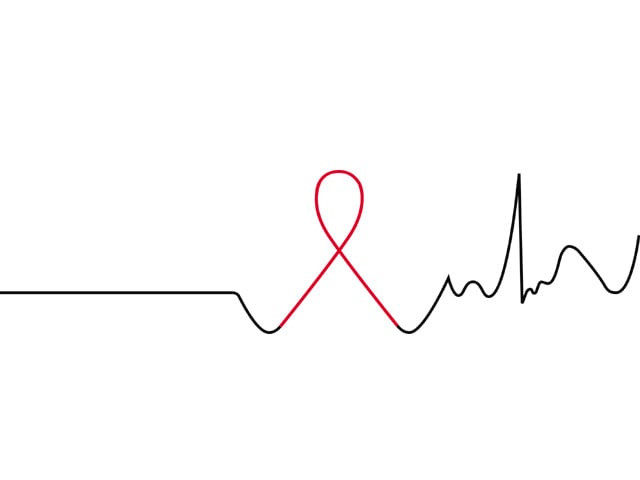World Aids Day: ‘Laws can help check the spread of HIV’
Doctors believe that people coming from other countries also broaden the scope of the virus.

“Many women in the country become HIV-positive after marrying men who have HIV,” said Qazi. “There is no legislation in the country which grants a woman the right to ask her future husband to get tested for HIV/AIDs,” he added, explaining that the majority of his patients are women who have contracted the disease from their husbands.
“I have diagnosed many women who contracted this disease from their husbands who [were previously living] abroad,” said the doctor, who believes that there should be some way to inquire into the cases in which “people come back from abroad before their visas expire”.
Qazi told The Express Tribune that one of his patients was a man who had come from South Africa. He was “on his death bed” with HIV when he came to Qazi for treatment. After becoming slightly better, the patient came to Qazi one day with news that he was getting married.
“I was shocked when he came to me with his wedding invitation,” said Qazi, who claimed that he had asked NGOs to help him try and stop the man from getting married. However, “he changed his house and mobile phone number and no one knows where he is now,” Qazi said.
“In our society, HIV/AIDS has been introduced like a deadly disease and its root lies in illicit relationships. This really discourages and embarrasses the patients, who avoid seeking its treatment,” said the doctor.
However, a policy regarding the prevention of the virus seems to be in the making.
According to National AIDS Control Programme (NACP) manager Dr Sajid Ahmed, “A draft of the first ever HIV/AIDs policy has been formulated by the NACP and has been forwarded to the ministry of health for approval.”
The policy will contain a list of all the measures that can be taken to help prevent the virus from spreading any further in the country, he added.
Ahmed agreed that immigrants who are HIV-positive are one of the biggest reasons behind the spread of the virus in Pakistan.
“However, nothing can be done about this as it will affect our relationships with other countries,” he added.
Meanwhile, the ministry of health is organising training sessions to create awareness among sex workers and transgender people regarding the spread of the disease, Ahmed said.
Life for the victims
Bibi Zahida, 33, and her 45-year-old husband, Abdul Ghafar, are both HIV positive. The couple, who hail from Pishin, got married 17 years ago and have five children.
According to Ghafar, his wife - who is under treatment at Pims - was infected when she got a blood transfusion during an abortion. He was of the view that he was infected through Zahida.
“We live in a joint family system and no one from our family knows about our disease. If they found out, we will be kicked out,” he said.
Meanwhile, for 23-year-old Anee, also an HIV patient, her life took a turn for the worse when she went for a pre-natal check-up one day.
“I cannot forget the moment when during the check-up, I was diagnosed as HIV-positive,” said a tearful Anee, who is a sex worker.
The 23-year-old woman said that she had been living a content life with her parents in Gujar Khan until the day she met a man at a shop.
“The next day, he called me and asked me to meet him,” said Anee. The couple started meeting regularly and one day the man initiated a physical relationship between them.
“I did not say no to him as I was deeply in love with him,” she added, adding that a few months later, he asked her to marry him and leave her parents’ house.
“We both went to Lahore as I knew my parents would not agree to this marriage,” Anee said. After living in Lahore for a few months, the man took Anee to see a woman, introducing the latter as Aunty Shazia.
“He left me [with her], saying that he had to go to Karachi to resolve some family issues, but would be back soon,” said Anee, who found out that Aunty Shazia was a sex worker and the man was one of her clients who had come from Saudi Arabia. Anee realised that she was now part of the business. Later, she came to know that she was also two months pregnant.
“Love is blind, and this I learned when I was diagnosed with HIV positive,” she said, adding that when she had told Aunty Shazia about the situation, the latter kicked her out of her house.
“I was on the streets and at God’s mercy,” said Anee, who gave birth to a baby boy who also turned out to be HIV-positive.
“My baby and I are living a life worse than a street dogs and I do not have the courage to go to the hospital for treatment as I am ashamed of what I did.”
The names of people infected with HIV or living with AIDS have been changed to protect their identities
Acquired Immunodeficiency Syndrome (AIDS)
CAUSE: Human Immunodeficiency Virus (HIV)
SPREAD: Use of un-sterilised needles, transfusion of infected blood, sexual contact, genetics
SYMPTOMS: At primary stage: Flu, aching muscles, sore throat and swollen glands
DIAGNOSIS: Within two to six weeks of exposure, the majority of the infected people will have a positive HIV-antibody test, with virtually all being diagnosed as HIV-positive within six months.
PREVENTION: Awareness and advocacy
Published in The Express Tribune, December 1st, 2010.



















COMMENTS
Comments are moderated and generally will be posted if they are on-topic and not abusive.
For more information, please see our Comments FAQ